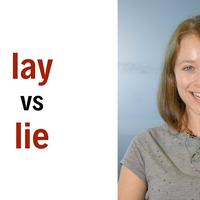Lie vs Lay - English In A Minute - YouTube
liegen|||Englisch||einer||YouTube
||놓다|||||
verbo||Lay|||||
Lie vs Lay – Englisch in einer Minute – YouTube
Lie vs Lay - Inglés en un minuto - YouTube
Lie vs Lay - English In A Minute - YouTube
Lie vs Lay - Inglese in un minuto - YouTube
Lie vs Lay - English In A Minute - YouTube
거짓말 대 거짓말 - 1분 만에 배우는 영어 - YouTube
Lie vs Lay - Angielski w minutę - YouTube
Lie vs Lay - Inglês num minuto - YouTube
Lie vs Lay - English In A Minute - YouTube
Lie vs Lay - Bir Dakikada İngilizce - YouTube
Брехня проти брехні - англійська за хвилину - YouTube
Lie vs Lay - 一分钟英语 - YouTube
Lie vs Lay - 一分鍾英語 - YouTube
I'm Sian from BBC Learning English,
Я Сиан из BBC Learning English,
and today we're going to look at the difference between
und heute werden wir uns den Unterschied zwischen ansehen
и сегодня мы рассмотрим разницу между
'lay' and 'lie'.
||mentir
poser||mentir
横たえる||横たわる
kłaść, położyć||leżeć
„liegen“ und „lügen“.
'kłaść' i 'leżeć'.
'lay' и 'lie'.
So 'lay' always has an object,
„Lay“ hat also immer ein Objekt,
Więc 'kłaść' zawsze ma dopełnienie,
Таким образом, "лежать" всегда имеет объект,
and it means
und es bedeutet
a to znaczy
и это значит
'put something or someone down carefully'
'etwas oder jemanden vorsichtig hinlegen'
'무언가 또는 누군가를 조심스럽게 내려놓다'
'осторожно класть что-то или кого-то'
– normally in a flat position.
|||плоском|
|||horizontal|flat
|||수평|위치
|||plana|
– normalerweise in einer flachen Position.
- 일반적으로 평평한 위치에 있습니다.
– zwykle w pozycji płaskiej.
- обычно находится в плоском положении.
When I eat I lay a cloth on the table.
||||mets||nappe|||
||||||tablecloth|||
||||||toalha|||
wenn|ich|esse|ich|lege|ein|Tuch||dem|Tisch
||||||식탁보|||
||||||mantel|||
||||置く|||||
||||kładę|||||
Wenn ich esse, lege ich ein Tuch auf den Tisch.
식사할 때는 테이블 위에 천을 깔아놓습니다.
Kiedy jem, kładę ścierkę na stole.
Когда я ем, я кладу на стол салфетку.
You can lay a baby in a cot.
|||||||кроватка
||mettre|||||berceau
you|||||||crib
|||||||berço
|||||||침대
|||||||łóżeczko
|||||||ベビーベッド
||acostar|||||cuna
Sie können ein Baby in ein Kinderbett legen.
W łóżeczku można położyć dziecko.
Ребенка можно уложить в люльку.
The past tense is 'laid',
||||legte
||시제||놓았다
||||położony
||||posta
Die Vergangenheitsform ist 'gelegt',
Czas przeszły jest „ułożony”,
but careful with the spelling.
|vorsichtig|mit||Rechtschreibung
||||철자
|cuidadoso|con||ortografía
aber achte auf die rechtschreibung.
ale uważaj na pisownię.
I laid all my cards on the table.
||||Karten|||
||||카드|||
|położyłem||||||
|puse||||||
Ich legte alle meine Karten auf den Tisch.
모든 카드를 테이블 위에 올려놓았습니다.
Położyłem wszystkie moje karty na stole.
The verb 'lie' doesn't have an object
Das Verb „lügen“ hat kein Objekt
Czasownik „kłamać” nie ma dopełnienia
Глагол 'lie' не имеет объекта
and it means that you are 'in a flat position'
||||||||plano horizontal|
und es bedeutet, dass Sie sich in einer flachen Position befinden
그리고 그것은 당신이 '평평한 위치에 있다'는 것을 의미합니다.
a to oznacza, że jesteś „w płaskiej pozycji”
и это означает, что вы находитесь "в ровном положении".
or you 'put yourself in a flat position'
||||||수평한|
oder du bringst dich in eine flache Position
lub „stawiasz się w płaskiej pozycji”
или вы "ставите себя в плоское положение".
- so you move on your own.
- Sie bewegen sich also alleine.
- więc poruszasz się sam.
Tonight I want to lie on the sofa and watch a film.
||||être étendu|||||||
|||||||소파||||
||||横になる|||||||
Heute Abend möchte ich auf dem Sofa liegen und einen Film anschauen.
Dziś wieczorem chcę leżeć na sofie i obejrzeć film.
Сегодня я хочу лечь на диван и посмотреть фильм.
But be careful.
Aber sei vorsichtig.
Now, the past of 'lie' is 'lay'.
||||||posé
||||||横たわる
||||yace||
Nun, die Vergangenheit von „Lüge“ ist „Lay“.
Otóż, przeszłość „kłamstwa” to „leżenie”.
Yesterday I lay on the beach and read my book.
|||||Strand||||
ayer||estuve|||||||
Gestern lag ich am Strand und las mein Buch.
Wczoraj leżałem na plaży i czytałem książkę.
Вчера я лежал на пляже и читал свою книгу.

